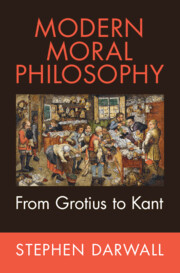Book contents
- Modern Moral Philosophy
- Modern Moral Philosophy
- Copyright page
- Dedication
- Contents
- Preface
- Acknowledgments
- Introduction
- 1 Grotius
- 2 Hobbes and Pufendorf
- 3 Locke and Cumberland
- 4 Spinoza, Cudworth, Shaftesbury, and Leibniz
- 5 Hutcheson and Butler
- 6 Hume and Smith
- 7 The British Rationalists and Reid
- 8 Rousseau and Kant
- Works Cited
- Index
7 - The British Rationalists and Reid
Published online by Cambridge University Press: 10 June 2023
- Modern Moral Philosophy
- Modern Moral Philosophy
- Copyright page
- Dedication
- Contents
- Preface
- Acknowledgments
- Introduction
- 1 Grotius
- 2 Hobbes and Pufendorf
- 3 Locke and Cumberland
- 4 Spinoza, Cudworth, Shaftesbury, and Leibniz
- 5 Hutcheson and Butler
- 6 Hume and Smith
- 7 The British Rationalists and Reid
- 8 Rousseau and Kant
- Works Cited
- Index
Summary
Hutcheson, Hume, and Smith wrote in opposition to a group of early eighteenth-century philosophers known as the “British rationalists,” which included Samuel Clarke, John Balguy, and William Wollaston. Richard Price was a later entrant in this debate on the rationalist side as, in some ways, was Thomas Reid’s Essays on the Active Powers of the Human Mind, though Reid, like Butler, was hesitant to characterize himself as a rationalist. In this chapter, we shall focus on the central elements of eighteenth-century British rationalism, beginning with Clarke and Balguy, but concentrating mostly on the more philosophically developed and interesting versions in Price and Reid.
The philosophical claims dividing rationalists and sentimentalists were primarily epistemological and metaphysical. Concerning epistemology: How and through what faculties do we judge, and perhaps know the truth of, moral and ethical propositions? And metaphysically: In what do moral and ethical properties consist (if they exist)? Epistemological differences were often grounded in metaphysical disagreements. It has not often been noticed, however, that these also had a fundamental conceptual aspect: The British moralists were concerned with deontic morality and presuppositions of accountability in a way the sentimentalists generally were not.
- Type
- Chapter
- Information
- Modern Moral PhilosophyFrom Grotius to Kant, pp. 237 - 268Publisher: Cambridge University PressPrint publication year: 2023

